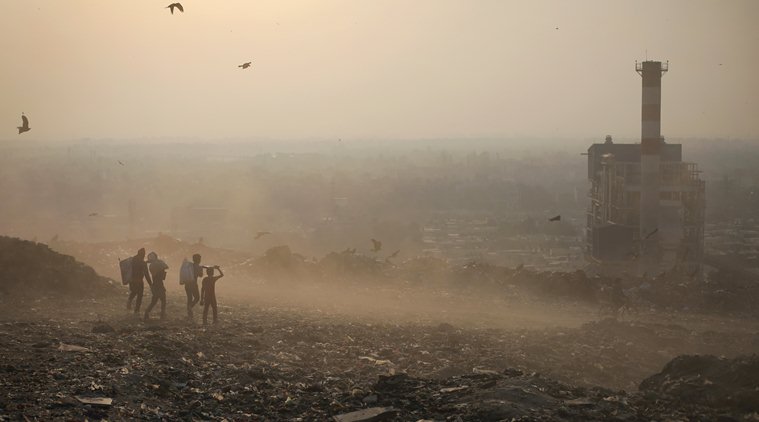The survival game: At the Ghazipur landfill, children defy death and disease

In this world of garbage and diseases — cancer, asthma and stomach illnesses are common — the children know that the games they play are deadly.
The 10-year-old explains the rules of the game to the seven-year-old: climb to the top of the mountain as quickly as possible, scan for treasures and avoid the monsters.
Childhood is nothing, if not imagining the world differently, shaping it to forms that one wants it to be. Here, the game is real though. The mountain is one made out of toxic trash, the treasure the children scan for is part of the waste — anything from glass bottles to human hair — and the monsters are the kites that swoop past them.
Not much has changed at the Ghazipur landfill in east Delhi over the past years. Before Arshad, 10, and Ali, 7, there were other children. The vultures that flew here when their parents were children have long since disappeared from Delhi’s skies. The kites remain, as do the games that make their daily lives — a routine of collecting garbage and swimming through filth — seem fun.
Arshad and Ali are one of the many children living in the slum next to Ghazipur landfill. Their father is dead. They have no memory of him. Their mother, Roshana Bibi, has little time to talk, even less to ensure that her sons are safe. They work, like their mother, collecting garbage and selling it at paltry sums to make ends meet. “Hair sells well. It’s hard to find. Glass bottles and plastic bottles sell less well since the GST. But garbage is only good when it’s fresh. Glass bottles can break and plastic bottles can be hard to clean. You have to get it quickly,” says Ali, knowledgeably, even as his brother continues scanning the mountain, bending down at intervals when his practised eyes spot some “treasure”.
There are no official estimates of the number of ragpickers in Delhi. But many, at Ghazipur, have been born near the 45 metre-high garbage dump. Almost all of them are Muslim, originally from Bihar, Bengal or Assam — migrants with few identification documents and fewer rights. The day a section of the Ghazipur landfill came crashing down last month, killing two people and pushing four vehicles off the road, into a canal, all of them were at the evening prayer for Eid.
“The two who died were on the street. But, here if we had died, do you think anyone would have cared? People die here,” says Rukhsana, 12, as she distractedly helps her mother in sorting out a motley of waste. Childhood and its games are already a thing of the past for her. Teenage girls here rarely play at the landfill, their routines are more “home-bound”: cooking food when the adults leave, usually a simple fare of chokha, rice and dal. The afternoons are spent sorting out the waste, preparing for the next day’s sales.
Read More Here


No comments: